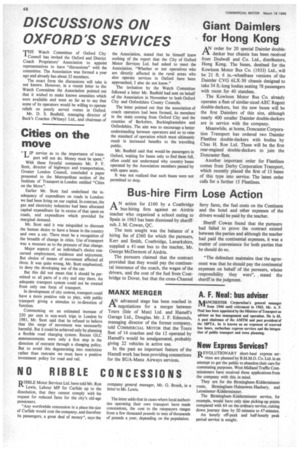Cities on the move
Page 50

If you've noticed an error in this article please click here to report it so we can fix it.
"LIP service as to the importance of transport will not do. Money must be spent." With these forceful comments Mr. P. F. Stott, director of highways and transportation, Greater London Council, concluded a paper presented to the Metropolitan section of the Institute of Transport in London entitled "Cities on the Move".
Earlier Mr. Stott had underlined the inadequacy of expenditure on roads in London: we had been living on our capital. In contrast, the gas and electricity industries had been allocated capital expenditure far in excess of that spent on roads, and expenditure which provided for marginal demand.
Mr. Stott said it was misguided to discount the human desire to have a house in the country and own a car. There must be a recognition of the breadth of change in cities. Use of transport was a measure as to the pressure of that change.
Major aspects of an individual's choice concerned employment, residence and enjoyment. But choice of means of movement affected all three. It was quite wrong, Mr. Stott emphasized, to deny the developing use of the car.
But this did not mean. that it should be permitted to all parts of a city and stay there. An adequate transport system could not be created from only one form of transport.
In development of city centres, transport could have a more positive role to play, with public transport giving a stimulus to re-direction of function.
Commenting on an estimated increase of 250 per cent in non-work trips in London by 1981, Mr. Stott said that he refused to believe that this surge of movement was necessarily harmful. But it could be achieved only by planning a flexible road charging system. Recent GLC announcements were only a first step in the direction of restraint through a chawing policy. But to avoid this degenerating into restriction rather than restraint we must have a positive investment policy for road and rail. the Association, stated that he himself knew nothing of the report that the City of Oxford Motor Services Ltd. had asked to meet the Association. "Whether or not operatives who are directly affected in the rural areas who also operate services in Oxford have been approached, I also do not know."
The invitation by the Watch Committee followed a letter Mr. Busfield had sent on behalf of the Association in November to both Oxford City and Oxfordshire County Councils.
The letter pointed out that the association of coach operators had been formed, its members in the main coming from Oxford City and the counties of Berkshire, Buckinghamshire and Oxfordshire. The aim was to encourage a better understanding between operators and so to raise the standard of operation which must ultimately result in increased benefits to the travelling public.
Mr. Busfield said that would-be passengers in Oxford, waiting for buses only to find them full, often could not understand why country buses operated by the Association members passed by with spare seats.
It was not realized that such buses were not permitted to stop.




































































































































































